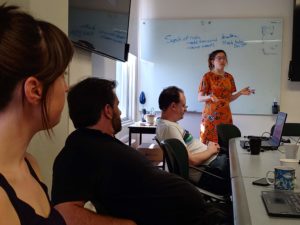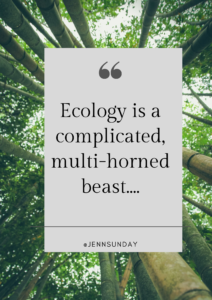The LTER Network Office at UCSB is fielding a new call for synthesis proposals with a deadline of October 23, 2019, so we are taking liberties with the format of this newsletter to bring readers a few thoughts on the variety of research that constitutes synthesis, the reasons we find it valuable, and a sampling of practical approaches that have worked for our current synthesis working groups.
There are probably as many definitions of synthesis as there are practitioners. It can include integration across time, space, landscapes, communities, or other dimensions. It can be as straightforward as compiling diverse datasets for reuse or it may employ advanced statistical methods, modeling, and forecasting. The ultimate purpose of a synthesis effort may be discovery — chiseling away at a massive pile of data to reveal a new ecological principle. Or the goal may be to transform research data into something more useful for resource managers and decision makers.

Members of the Synchrony synthesis group discuss progress tasks and timelines.
Credit: LTER Network Office CC BY-SA 4.0
For the purposes of the LTER synthesis working group opportunity, we have put a few bounds around these very broad definitions of synthesis. Synthesis working group proposals must draw on existing data and research from more than one LTER site (though sites outside LTER are welcome as well) and the proposed work should require the diverse skills and viewpoints of multiple researchers. We suggest that a focus on the LTER Program’s 7 (5-plus-2) core research areas may be beneficial, but are also open to ideas that don’t neatly fit those categories. For more detail on how we define synthesis for this purpose, view the 2019 Request for Synthesis Proposals.
Why Synthesize?
The twitter hastag #whyisynthesize leads to a wealth of answers. A few of my personal favorites:
From Xavier Benito (xavier2bgranell), Postdoctoral Fellow at the Social Ecological Synthesis Center (SESYNC): “I synthesize…to help others see the puzzle.”
From Jennifer Sunday (@JennSunday), Assistant Professor at McGill University: “Ecology is a complicated, multi-horned beast. I believe that the intertwining of questions, data, experienced minds, creative thinking and fast coding can propel to new understanding.”

How to Synthesize?
The International Synthesis Consortium lists 13 active scientific synthesis centers and that doesn’t even include synthesis centers for medical or public health information. In the nearly 25 years since the National Center for Ecological Analysis and Synthesis was launched at UC Santa Barbara, many journal articles, resource pages, toolboxes, and how-to guides have sprung up attempting to smooth the road for young investigators tackling their first synthesis project. The LTER Network Office has developed a list of our favorite resources on topics such as how to think about the team you convene, facilitating for diverse voices, and conducting reproducible analysis.
We’ve also asked two of our current synthesis working groups to briefly describe their experience with the process, including how their goals evolved and how they approached the design of their meetings and maintained communication between meetings. Both groups had their roots in earlier efforts, emphasizing the sometimes episodic progress of synthesis, where an idea can germinate at an All Scientists’ Meeting, a society meeting, or a chance encounter — be nurtured for a time, then lie dormant while methods evolve or new data accumulate — and emerge again at a time that is ripe for quicker progress.
In this issue, we present the process and findings of two synthesis groups that were funded in the 2016 call for proposals. Both the Communities-to-Ecosystems (C2E) group and the Metacommunities group have produced substantial results, and will continue to submit papers, software packages, and other products over the next few years, emphasizing the sustained effort and results that are characteristic of synthesis activities.
Their summaries offer a window into two very different approaches to project management, as well as some cautions about potential pitfalls and diversions. May you find them enlightening and inspiring — and if they inspire you to pursue a synthesis worthy idea, please join us for the next LTER synthesis informational webinar on September 17, 2019.





